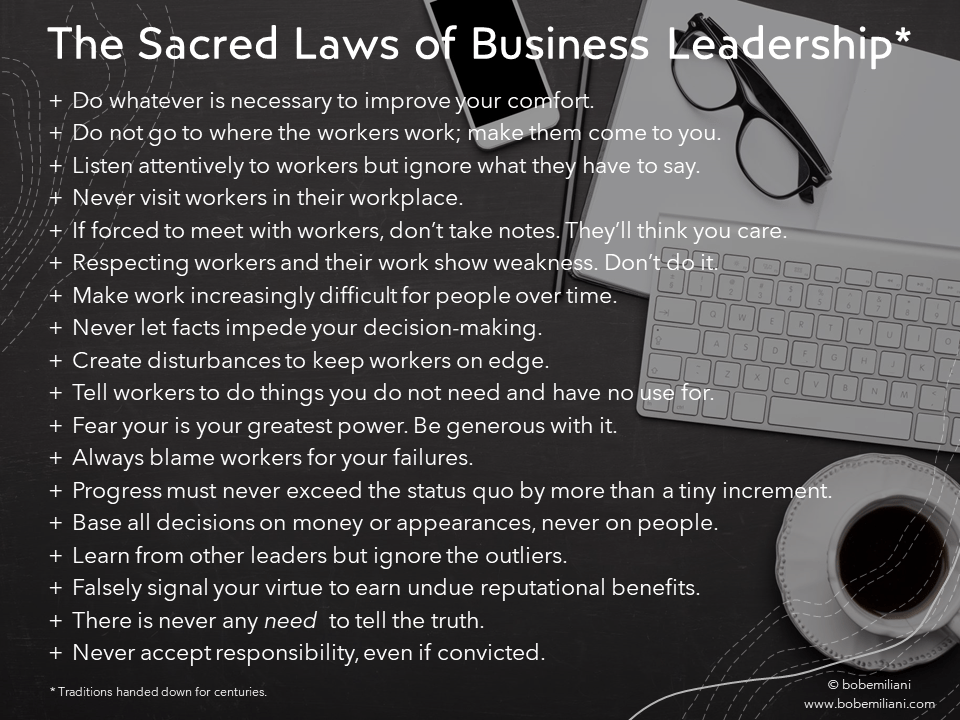
A common bit of feedback that I receive now and then is that I am “courageous” or “brave” to say the things that I say about Lean management, the Lean movement, business leaders, and the like. I don’t see it as courage or bravery. From my perspective I am simply sharing the facts as I see or understand them, based on my industry experiences, observations, and research, so that others can learn or benefit from my work. I see it as a professional duty in relation to my job as a professor and as a member of the Lean community (though not in good standing 😁).
But let’s go with the feedback and say that I am indeed “courageous” or “brave.” It begs the question of why so few others are. Why is there so little courage in Lean-world to speak the truth, acknowledge the truth, or share what they know to be the truth? Sure, some people speak the truth, but it is characteristically more weak and incomplete than forceful and getting to the root of the problem. For a community that harps on “respect for people” (starting in 2008), it allows legions of people to struggle beyond reason to discover the hard truths themselves.

I cannot state with any direct knowledge why people lack the courage to forcefully say what needs to be said to Lean practitioners and business leaders. When I ask people who tell me I am courageous why they think courage is lacking in others, they cite these reasons:
- Personal and business success requires them to be uncritical of Lean
- They have greater personal aspirations
- Being popular matters more than facts
- It is easier to go along and to get along
- The in-group believes itself to be unique and superior
In my case, I do not have concern for personal success. I have long had no aspiration to be anything more than what I am — a former industry guy who has a job where he can think and write and share his knowledge. Business success is nice if it happens, but I do not make decisions based on business (money-gain). I have never been concerned about being popular; I would rather be judged by history than by my peers. I can attest to the fact that not going along can be difficult in a variety of ways. And it does seem to me that there are solid indications of group narcissism.
There is perhaps also an instinctive dislike for having to revisit what they believe to be settled knowledge and wisdom when it comes to Lean. In one way or another, critical analysis of Lean identifies problems, defects, or flaws — a type of innovation that is seen as vulgar, which those at the top must distance themselves from and scrupulously avoid responding to. This may be rationalized as being the more reputable and honorable course of action. Yet in doing so, Lean-world has developed its own traditions that are defensive (status-quo oriented) and which shun progress (continuous improvement). It is never a crime to be hypocritical, but it is indecent of Lean people who are well-schooled in higher standards of conduct.
If the truth is seen as a detriment to what has been previously established, then Lean is poised to stagnate over the long-term, whereas Toyota’s management system and TPS continues to evolve because the truth is seen as a benefit; that which is advantageous. In Lean-world, criticism born of scientific thinking works to the detriment of what has been previously established, and so the merit of any criticism has far less value compared to Lean’s young, but now deeply rooted, traditions.
The image below is a not-too-far-from-the-truth depiction of leadership according to classical management. This is what Lean management is up against. The image tells it like it is, but prominent Lean people act as if the challenge is not so stark; that the success is much closer than the image indicates. Time and effort are wasted on depicting matters in that more favorable light. Instead, effort should be redirected towards understanding the harsh reality of the situation and identifying countermeasures to try. Absent this, I cannot think of many of my esteemed colleagues in any other ways than ignorant, willfully ignorant, or duplicitous in their professional capacity as influential Lean people, and lacking empathy for the many who struggle to advance Lean yet are blocked by leaders who seek to preserve classical management. These people put their careers and livelihoods on the line for Lean, and so we owe them more than platitudes and continuous recitation of the well-known problems and challenges associated with Lean management.

These days, the advancement of Lean seems more like a game of “likes” and approval, piffle and flimflam, than a serious factual endeavor to improve the practice of management and human existence. Perhaps I misunderstand, having been shackled to the romantic visions of the early days of Lean. Serious, thoughtful effort taps into one’s sense of responsibility and duty, and to understand the relationship between decisions and consequences. The Sacred Laws of Business Leadership demand a more widespread grasp of the seriousness of the situation and focused action that Lean not may have been capable of offering because the current state, shown in the above image, was not understood until just three years ago.
